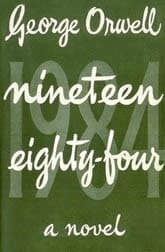Nineteen Eighty-Four
Critique • Quotes
 First edition
First editionAlso known as
1984
First publication
1949
Literature form
Novel
Genre
Science fiction, dystopia
Writing language
English
Author's country
England
Length
Approx. 105,000 words
Are we still scared of 1984?
George Orwell's dystopian novel has had the fortune to be acclaimed in the West by two usually opposed groups—right wingers and left wingers. The former saw it as a denunciation of collectivism in all its forms while the latter (liberals, social democrats, anarchists, Trotskyites, New Leftists) hailed it as a warning against Stalinism, or Soviet-style centralism.
How did Orwell mean it? We have his own comments the novel was not anti-socialist but against all twentieth-century ideologies tending toward authoritarianism. This view is borne out in the book by the observation by the torturer O'Brien that the rulers of the three rival political groupings in that world have all adopted the same measures of complete control over their citizens.
Having recently re-read it, I find the book rather confusing. Dare I say irrelevant?
This is not due, as you might guess, to us having passed the year 1984 without such a society arising. Nineteen Eighty-Four was not supposed to be a prediction. Orwell supposedly once thought of calling the book Nineteen Forty-Eight since he was basing it on trends he was noticing in the year when he was writing the book. And in Nineteen Eighty-Four, the fictional government has succeeded in re-writing history so thoroughly that the main character is not sure what year it actually is. It could be 2084.
Social control
My doubt experienced in reading Nineteen Eighty-Four is due to the implausibility of the dystopia coming about in the way Orwell describes it. Such heavy-handed propagandizing by any government is unlikely to have this long-term and perfectly uniform effect in a society. To think you could brainwash an entire human population so completely with sloganeering and threats of torture—with hardly a single misstep—seems naive now. Social control is achieved at least temporarily with much more subtle methods.
I know I'm going to get responses pointing out current or recent examples of blunt totalitarian control in the world, but I'll answer that people also have a long history of overthrowing such regimes.
The motivations in Nineteen Eighty-Four seem rather stretched to anyone with a sophisticated political understanding. The rulers rule for no reason apart from liking to rule, although they don't seem to benefit from this in any way. The masses of "proles" who make up the bulk of the population are quite happy to let the government have its way with them.
I know various pundits will argue this is the state of much of the world today—but they are exaggerating, as pundits do. There are threads of this in our world and in some places at some times the threads are stronger. But it's never so thoroughly—utterly successfully—imposed as it is in Nineteen Eighty-Four.
Sorry, but sometime before or since 1984 came and went I stopped fearing this. Perhaps I've read too many other science-fiction visions of the future in the decades since Nineteen Eighty-Four was published or perhaps I've seen too much modern history to buy into this vision as anything but simplistic.
Aldous Huxley's Brave New World,published fourteen years earlier, seems a more savvy prediction of a future in which a superficially comfortable populace is controlled by drugs, media and complacent hedonism. It's certainly closer to what I see around me today.
Language of thought control
To be fair, Orwell himself noted he himself did not expect the world of Nineteen Eighty-Four to come about. Rather he was pointing out certain disturbing trends at the time. One of these trends is the connection of the bureaucratic impoverishment of language with the decline of independent thought, as shown in the development of Newspeak in Nineteen Eighty-Four. This is so important to Orwell that he includes an appendix on the principles of this synthetic language.
This is interesting material but it also seems very doubtful any such artificial language could be imposed on people. Language develops and evolves in a much more complicated and unmanageable fashion. I know you can point to examples of double-speak in government and media today, but these are small examples within the larger shifting of language over vast populations and periods.
The plot of this novel I also find simplistic today. It consists of the protagonist privately questioning what he is supposed to think, breaking the rules on sexuality, trying to join a rebellious underground, getting caught and being tortured. Much of the text is given over to explicating the history and philosophy of the society. Some of this may have had greater impact some years ago when it was first presented.
The downer ending may have been shocking at one time, but now it seems truncated. Again, I may have been exposed in novels, films and television shows to too many such stories to be greatly disturbed by this tale any longer.
I know Nineteen Eighty-Four will remain in the classic category for many years to come. We've adopted too many ideas and phrases from this novel for it to disappear from public consciousness for quite a while. However, I wouldn't be surprised if it eventually becomes a curiosity, a marker of a bygone era, rather than a novel that people read for enjoyment or enlightenment.
I might just mention that almost everyone online disagrees with me, calling Nineteen Eighty-Four a timeless masterpiece, prophetic, more relevant today than ever, and so on.
Of course, they are wrong and when I come to power I will make them see that.
— Eric
Critique • Quotes

